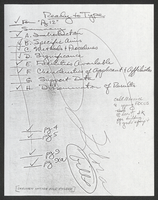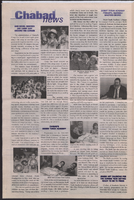Search the Special Collections and Archives Portal
Search Results
Leon Rockwell Papers
Identifier
Abstract
The Leon Rockwell Papers (1829-1986), consist of materials that document Leon Rockwell's life in Las Vegas, Nevada from 1906 until his death in 1968. Included are diaries, correspondence, photographs, postcards, Las Vegas community event programs, ledger sheets, business cards, and scrapbooks. There are a number of books, information on organizations and businesses that Rockwell owned, real estate documents, and early records of the Las Vegas Volunteer Fire Department, of which Rockwell was an original member.
Archival Collection
Thomas Schiff Panoramic Photographs
Identifier
Abstract
The Thomas R. Schiff Panoramic Photographs (2001-2009) are comprised of physical and digital panoramic photographs of hotel casinos and other locations around Las Vegas, Nevada used in his book,
Archival Collection
Jeanne Russell Janish Photograph Collection
Identifier
Abstract
The Jeanne Russell Janish Photograph Collection (1918-1974) consists of 48 black-and-white and color photographic prints that feature Janish's family, her husband Carl Janish, family homes and pets, and travel photographs from the United States, China, and South America.
Archival Collection
Elizabeth and Charles Pratt Personal Papers
Identifier
Abstract
The Elizabeth and Charles Pratt Personal Papers consist of correspondence, travel information, and photographs from the Pratt family dating from 1895 to 1953. The majority of correspondence in the collection is between Charles Pratt and his wife, Alice Elizabeth Margaret "Diane" Pratt. The collection also contains correspondence between Elizabeth Pratt's parents and her literary journals from her time attending Swarthmore College, in Swarthmore, Pennsylvania.
Archival Collection
Aaron Williams Photograph Collection
Identifier
Abstract
The Aaron Williams Photograph Collection (approximately 1968 to 1983) consists of three black-and-white photographic prints. Two of the images are of the groundbreaking ceremony of the Senior Citizens’ Center with Las Vegas, Nevada Mayor Oran Gragson, and the third of three unidentified individuals.
Archival Collection
Hazel Baker Denton Papers
Identifier
Abstract
Hazel Baker Denton Papers (1907-1957) contain correspondence, family artifacts, scrapbooks, newspaper clippings, and family biographical information. Included are journals that chronicle the years Denton served as an Assemblywoman for the Nevada State Legislature and a copy of her book, Ironing Day, her newspaper columns, and speeches.
Archival Collection
Tony Wuehle Collection
Identifier
Abstract
The Tony Wuehle Collection documents the activities of freelance writer, college president, and poker expert Edwin "Tony" Wuehle of Michigan and Las Vegas, Nevada, between the years of 1950 to 2007. The collection consists of copies of Wuehle's regular columns, newsletters, and special articles as they were published in various journals and newspapers, especially those related to poker, the International Home and Private Poker Player's Association (IH3PA), education administration, and religious concerns.
Archival Collection
Jarbidge, Nevada Community Archives Collection
Identifier
Abstract
The Jarbidge, Nevada Community Archives Collection contains scanned images from seven archival collections and document the community of Jarbidge, Nevada from approximately 1910 to 2006. The materials were collected from various families living in Jarbidge in 2006 as part of a project led by Carrie Townley Porter. The images depict early Jarbidge structures, surrounding landscape, the Elkoro Mine, and residents of the area. Also included are images of certificates, correspondence, and newspaper articles relating to the families' histories. Also included in the collection are written summaries of ten oral history interviews of Jarbidge residents conducted in 2006. This collection contains digital surrogates only; the owners and Jarbidge Community Archives retain the originals.
Archival Collection

University of Nevada, Las Vegas law school establishment: correspondence
Date
Archival Collection
Description
Folder from the Flora Dungan Papers (MS-00193) -- Series 4. University of Nevada Regents Material.
Text

